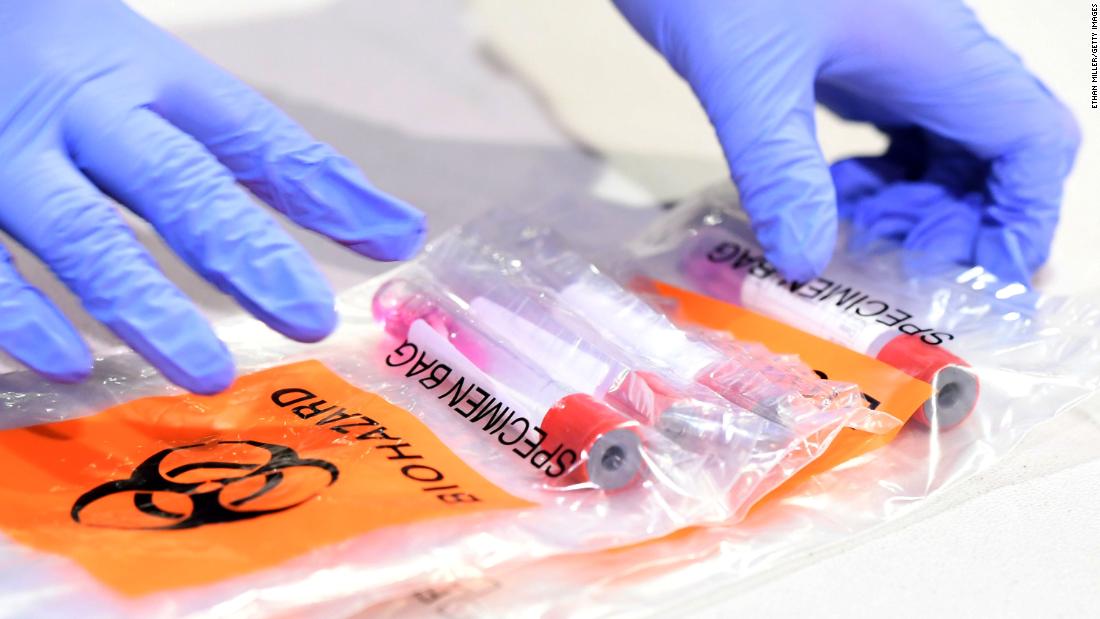(CNN) — In the current Covid-created travel maze, passengers face constantly shifting rules as airports, countries and even airlines impose their own restrictions on who can cross international borders.
Testing has been adopted by various places as a key to allowing transit, leading to more widespread calls from the travel industry to use this to facilitate the return to a more normal flow of passenger traffic.
But is testing — and the introduction of so-called Covid immunity passports that show when someone has recovered from the infection — really the key to getting the world in the move again?
The answer, of course, isn’t simple.
PCR — the gold standard
There are two categories of testing for Covid-19, which determine whether you have a current or past infection. Virus testing, using a swab, confirms if you currently have the virus, and the gold standard is the polymerase chain reaction (PCR) test. That is the type of testing we’ll be focusing on in this article.
Antibody testing determines whether you have been infected with Covid-19 in the past. We do not know whether this means a person is immune, or how long any immunity might last.
The problem with virus testing is that it is only a snapshot in time. When Iceland introduced airport testing as a way to open up its borders, it quickly became apparent that the virus was still arriving despite negative tests, prompting the country to reintroduce a limited quarantine.
“I don’t think people have a clear concept of testing,” Rex Gerald, senior researcher at Missouri University of Science and Technology, tells CNN Travel. “The moment you take the test you are negative but by the time you get home you could have interacted with people and contracted the disease.”
Passengers arriving from high-risk countries wait to carry out rapid antigenic tests at Rome’s Leonardo Da Vinci airport on August 25.
Antonio Masiello/Getty Images Europe/Getty Images
Testing in practice
Hong Kong International was the first airport to implement arrivals testing and its approach illustrated the cumbersome logistical problems involved.
Passengers transferred to a facility for testing and awaiting results, which usually arrived on the same day. Since then it has imposed complex rules on who is to be denied entry, who can transit the airport to a beyond destination and who must provide proof of testing from a reputable lab.
Similarly, the €120 test ($140) at Vienna Airport puts arriving passengers into a holding area while they await results. Whether or not testing is mandatory depends on the country of origin, meaning more confusion for travelers and the likelihood of more customs- and immigation-style delays.
Today, many airports, including London Heathrow and New York JFK are working on testing. But those who have a health certificate showing a negative Covid-19 result within 72 hours of arrival could skip inbound testing.
The travel industry wants governments to develop a global, harmonized approach that would replace wanderlust-crushing travel bans and 14-day quarantines with rapid, accurate testing.
Emirates will cover customers’ expenses if they contract Covid-19 during their trip.
Courtesy Emirates
A global standard could ease traveler confusion. Today, with so many requirements, questions remain. Should they get tested and, if so, when and how often will they need to be tested during the trip? What is required by the airline, country or hotel? Do recovered Covid cases retain immunity and, if so, for how long?
For many questions, there are no answers. Even the development of a vaccine won’t necessarily offer an ending, since the length of its effectiveness will be unknown.
An ever-changing list of countries, airports, airlines, cruise lines, spas and hotels are implementing restrictions that require a negative result for travel.
In many countries, travelers can access pre-travel testing through their healthcare provider within a few days of travel, depending on availability, the country or airline requirements. Armed with negative test results, it is assumed they cannot spread the disease — although of course, they could still pick up the virus straight after leaving the test center.
As to who pays for testing, it depends. The International Air Transport Association (IATA) reported arrival testing costs travelers as much as $200 for some European destinations. Multiply that by a family of four and a trip becomes questionable, along with whether or not such costs are covered by insurance.
‘Immunity’ passports
One “passport” innovation is Israeli company Pangea’s Covid-19 International Travel Card, a secure digital card designed to enable fast, cross-border identification, according to CEO Rafi Kaminer. Other concepts would report whether or not a recovered person is immune.
“Our card enables authorities to know the actual Covid status of all inbound and outbound travelers, whether they were tested, who did the test, the results and whether they were tested for the current journey,” he tells CNN Travel.
“Travelers need to apply to government medical authorities who implement the online system which is integrated into Passport Control Authorities who can quickly approve or deny entry based on the card data. It is automatically updated with the test or when a vaccine is administered.”
Rapid tests
Meanwhile, researchers and tech companies in the US are in overdrive to develop rapid tests they say are stymied by government approvals.
As scientists scramble to develop rapid tests, a new debate is rising about tests that are faster than the standard PCR test, if not as precise. They question the need to have accuracy at that level.
Michael Mina, assistant professor and epidemiologist at Harvard T. H. Chan School of Public Health, argues that PCR testing is too slow, too costly and does little to stem the spread of the disease because it doesn’t identify when a person is infectious.
Ease backlogs
“Diagnosing people doesn’t do much to actually stop the outbreak,” says Mina. “PCR used as a diagnostic tool not only offers little for breaking transmission chains, but it actually is putting us down the wrong road. I want tests that will tell somebody that they’re transmitting at the time that they’re transmitting so they can act on it. I want them to take it every single day or every other day. If everyone who tests positive stayed home, we would break the transmission.”
Gerald says that by delaying deployment of alternative tests which could ease testing backlogs, public health officials could be doing more harm than good. The problem is current government approval requires comparison with the PCR test and alternative tests are not as accurate. Tests also need to pass muster with international health authorities.
“The whole idea is to keep the traffic flow moving,” Gerald tells CNN, describing the machine he and colleagues are developing for airport screening, giving results in three seconds. “It sorts passengers into pass or no-pass and allows the majority to continue on their way. If someone is flagged, they are given a five- to 15-minute PCR test.”
For now, testing is seen as the way to free travelers to roam about the planet. It is clear, however, travelers must proceed with caution. The fact remains that solutions designed to open up travel remain clunky. But the rapid progress being made means it is only a matter of time.









